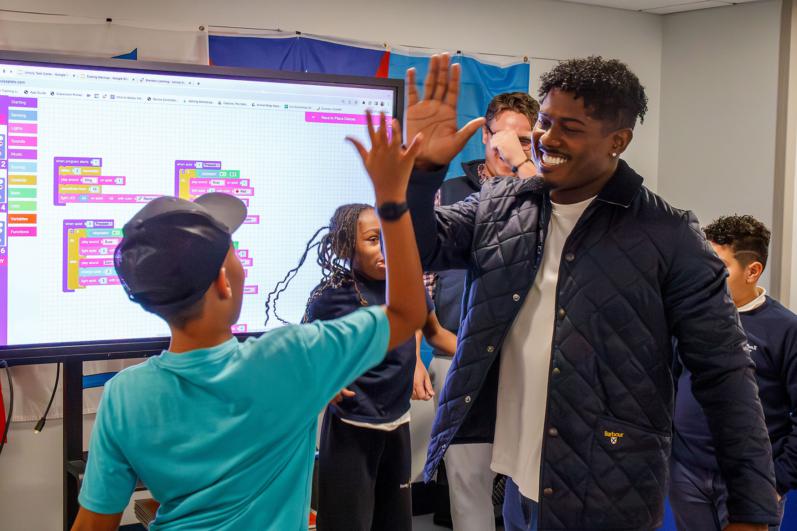Forming the Future: Patriots' Jonathan Jones visits Pope St. John Paul II Catholic Academy to promote STEM learning
DORCHESTER -- It may come as a surprise, but New England Patriots cornerback Jonathan Jones is as comfortable handling a sheep brain as he is handling a pigskin.
Jones dissected sheep organs, played tag with robots, and participated in eight other "STEM activation stations" during STEM Night at St. John Paul II Catholic Academy Lower Mills Campus in Dorchester on Oct. 17. Several of the "activation stations" will become permanent fixtures of the school, thanks to a donation of $50,000 in training and equipment provided by Jones's Next Step Foundation.
"That's right up my alley," Jones told The Pilot. "From the dissecting to the robots. Everything tonight is everything that I love to do."
Oct. 16 to Oct. 20 was STEM Week in Massachusetts. The governor's office chose Jones to be an "STEMBassador" for the "See Yourself in STEM" program, which encourages girls and children of color to get involved in science, technology, engineering, and math, fields where they have historically been underrepresented.
While attending high school in Georgia, Jones was in the engineering program and had an interest in science and technology.
"It's an honor to be here," Jones told Lower Mills Campus students, staff, and families. "Everyone looks at me as the football player, but there's so much more to me than that."
He thanked his mother for "forcing" him to pay attention to his studies, and said he hoped that the students would pay attention to theirs.
"All of our beautiful students here deserve to have high-quality learning here in our building," Principal Lisa Warshafsky told those in attendance, "and that is what we are doing, thanks to Jonathan and his foundation."
Warshafsky told The Pilot that the Lower Mills Campus doesn't have a STEM program, but a STREAM program -- Science, Technology, Religion, Engineering, Art, and Mathematics.
"Our mission in Catholic education is to ensure our students have access to a high-quality, faith-based education," she said, "that includes rigorous programming to elevate their God-given talents."
Ashley Green, director of the Next Step Foundation, said she could instantly tell that the Lower Mills Campus was a school worth supporting.
"From the moment you walk in," she said, "you can tell that it's a family and it's a safe environment. Everybody knows everybody."
She added that Jones "resonates with the students."
Between them, the Next Step Foundation and the Bedford-based iRobot company donated 12 remote-controlled robots to the school. Students will control the robots' movements by doing basic computer programming. During STEM Night, students programmed the robots to move along a whiteboard and draw pictures.
"The idea here is for students to be exposed to STEM," iRobot STEM Program Manager Lisa Freed said, "exposed to coding, and to leave here as software engineers."
Freed told the students that when she looks at them, she sees her future coworkers. When she was in school, she explained, STEM was boring -- there were no robots back then.
"Just have fun with it," she told them.
At STEM Night, kids could view the Amazon rainforest through virtual reality headsets and test their engineering skills by making miniature bridges out of marshmallows, candy corn, and toothpicks. In a station presented by Auburn University, Jones's alma mater, he and Lower Mills Campus students played tag by piloting remote-controlled robots on wheels. Jones won one game, but lost another to fifth grader Joscar Fernandez.
Joscar felt a little guilty about beating a Patriot, but he enjoyed himself.
"I like science because you get to learn new things and do things you really don't get to do a lot," he said.
"It brings me back to my childhood," Jones said, "just to give them that experience and see the joy on their faces."


















